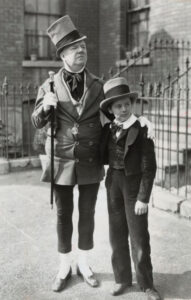by James Scott Bell
@jamesscottbell
Happy Father’s Day to all the dads out there! Don’t forget to tell a #DadJoke today.
What happened when two slices of bread went on a date? It was loaf at first sight.
Thank you! Tip your server on the way out.
Which brings me to four literary dads and what we can learn from them.
Atticus Finch
At the top of the list is, of course, Atticus Finch from To Kill a Mockingbird. A widower, Atticus is faced with the prospect of raising two young children without a mother. His daughter, Scout, presents a particular problem. She has budding prejudices as the result of her social environment, the deep South of the 1930s. She also likes to solve her disputes with boys by beating them up.
His greatest challenge is the heart of the book. It’s when he is asked by a local judge to undertake the defense of Tom Robinson, a black man accused of raping a white girl. Atticus takes the case, knowing he is going to lose. So why does he do it? He tries to explain it to Scout:
“Scout,” said Atticus, “when summer comes you’ll have to keep your head about far worse things…it’s not fair for you and Jem, I know that, but sometimes we have to make the best of things, and the way we conduct ourselves when the chips are down – well, all I can say is, when you and Jem are grown, maybe you’ll look back on this with some compassion and some feeling that I didn’t let you down. This case, Tom Robinson’s case, is something that goes to the essence of a man’s conscience – Scout, I couldn’t go to church and worship God if I didn’t try to help that man.”
Lesson: Live by the higher ideals, even if they fail in some circumstances, or any hope for civilization crumbles.
Daniel Peggotty
In David Copperfield, Daniel Peggotty offers a crucial counterpoint to David’s cold-hearted stepfather, Mr. Murdstone, as well as the odious and oily Uriah Heep (one of the best character names ever). Daniel’s love and loyalty to his family is the epitome of paternal virtue. He is the brother of David’s beloved nurse, Clara Peggotty, and happily welcomes young David into his home, treating him as he would a family member.
In particular, his devotion to his niece, Little Em’ly, results in a sacrificial quest to save her after she runs away with James Steerforth. He declares, “I’m a going to seek her, fur and wide. If any hurt should come to me, remember that the last words I left for her was, ‘My unchanged love is with my darling child, and I forgive her!’”
Lesson: A father protects his family, no matter the cost.
Vito Corleone
Wait, what? Don Vito Corleone in The Godfather? He’s the opposite of Atticus Finch, operating on the wrong side of the law. He has murdered and ordered murders. Now as he ages, he knows the future of his family is in the hands of his youngest son, Michael. Here he is, warning Michael of an impending attempt on his life…and sharing his sadness at Michael’s fate.
So why do we care at all about Vito Corleone? He’s the head of a crime family, for crying out loud. I think there’s a literary secret here. You can pull for a character who is not entirely good if, within the story context, he is “better” than the other bad people around him. In the case of The Godfather, Vito has refused to partner with another Mafia family in the drug trade. This leads to his attempted assassination. Thus, Michael’s revenge is understandable within that story world.
Lesson: You can love your children, but crime still doesn’t pay.
King Lear
Boy, what a bad dad. Which shows us we can learn from the negative (the raison d’etre of tragedy).
Lear is the opposite of Daniel Peggotty. Instead of familial loyalty to all three of his daughters, he rewards vain flattery and punishes the one daughter who expresses love, Cordelia. It isn’t long before the other daughters, Goneril and Regan, conspire to strip him of his power. He’s left a wandering lunatic, and runs for Congress. (I may be misinterpreting that last point.)
Lesson: Pride goeth before a fall. So, despite what TikTok says, life is not all about you.
In the immortal words of Graham Nash, we must “have a code that you can live by/And so, become yourself.” Nash wrote movingly about the inspiration for this song:
The origin of the song came from my recent infatuation with art. I had begun collecting photographs around that time, powerful images that had an emotional effect on me. One, in particular, was a Diane Arbus image of a boy in Central Park. It spoke volumes to me. The kid was only about nine or ten years old, but his expression bristled with intense anger. He had a plastic grenade clenched in a fist, but it seemed to me that if it were real the kid would have thrown it. The consequences it implied startled me. I thought, “If we don’t start teaching our kids a better way of dealing with each other, humanity will never succeed.”
Enjoy your day, dads. You matter.

